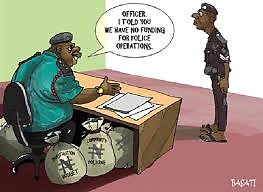Corruption disturbs order. It has an effect on politics, economics and the judicial system. It can be defined as “the use of public resources for private gain,” which basically includes embezzlement, bribery, and illegal extraction of public resources (Atuti, 2013). Corruption leads to poverty and inequality. How? Atuti presents the following examples:
- If court officials and the police choose bribery over law, then people will not have access to justice.
- If the education budget has been captured or used for other purposes, the schools cannot offer their students education, cannot pay teachers, and cannot buy school materials, which leads to a lack of education.
- If officials take more than their fair share of what farmers, market sellers and entrepreneurs sell, they will not be able to sustain themselves in their livelihood.
All of these examples show how attempts to improve society are lost when corruption is present.
Also the police in Kenya can often be bribed easily. In fact, it is the most corrupt sector both in Kenya and the rest of East Africa (Kimeu, 2013). Most Kenyans fear getting in touch with the police, because they know that they will have to bribe them.
Personally I have experienced the corruptness of police officers in Kenya. On our way back from safari, our driver took a short cut over the grass, because he knew the road was bad. On the other side of the grass lane a police officer was waiting for him. Instead of stopping, our driver decided to hit the gas and ignore the officer. What happened afterwards is a different story. That’s irrelevant to this story. So why did the driver not stop? It was not because he was unwilling to receive the fine. He knew that when he has Europeans in his car, the officers could smell money. When they smell money, the amount of the fine doubles. This small example shows a couple of things: the police are seen as money extractors instead of enforcers of the law, they are not taken seriously and because of this the role they are supposed to have essentially goes away.
How come corruption is such a problem in Kenya?
- Lack of political will
- Weak legislative framework
- Lethargic public perception (bribes are often offered before they are asked for)
- Limited resources
- Poor corporate governance
And perhaps one of the main reasons: it’s generally accepted in society. Even though most people would condemn corruption, when it really comes down to it the whole society participates in corrupt activities in one way or another.
On a positive note, many organizations, committees, and other initiatives have been set up to tackle corruption. The Corruption Perception Index (CPI) has been improved.
It is important that corruption is tackled on each level: the individual, the community, the organizational, and the national level. Only then institutions have a good chance of actually being able to do what they were created for in the first place.
References:
Atuti, Atunga. 2013. “Corruption and Its Consequences on Human Rights in Kenya.” Concordis International. Available from: http://concordis.international/wp-content/uploads/2013/02/Corruption-and-its-Consequences-in-Kenya-Nov-2013.pdf
Kimeu, Samuel. 2013. “Levels and Trends of Corruption in Kenya.” Concordis International. Available from: http://concordis.international/wp-content/uploads/2013/02/Corruption-and-its-Consequences-in-Kenya-Nov-2013.pdf
